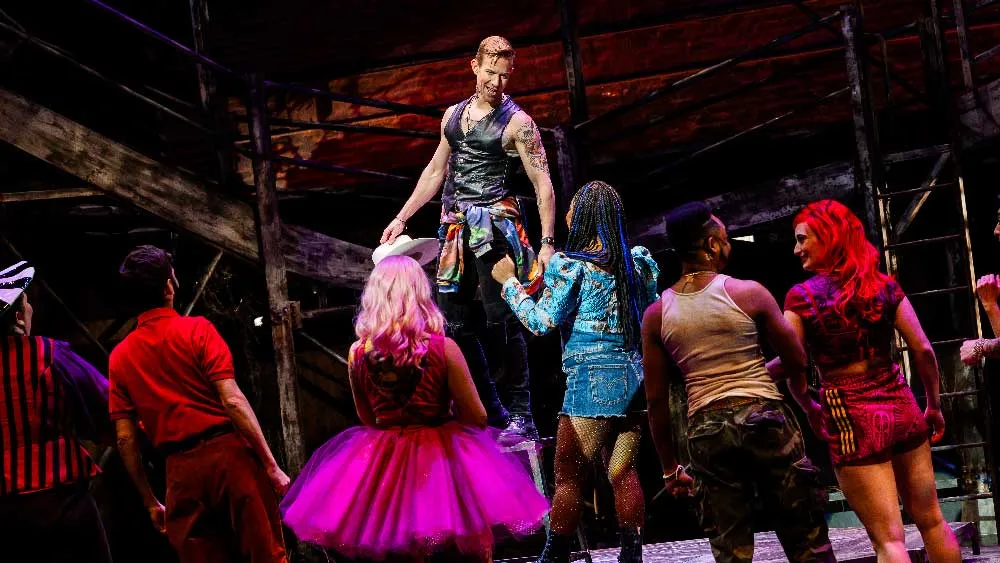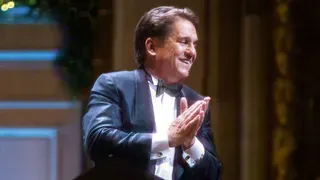October 2, 2023
NC Public Radio Station Refuses to Broadcast Upcoming Met Operas With Black, LGBTQ+ Content
READ TIME: 8 MIN.
When are operas unsuitable for broadcast?
What has never seemed to be a problem for the Metropolitan Opera Saturday afternoon broadcasts of live opera today has become one, after a North Carolina classical radio station decided to drop a number of operas from the upcoming season due to content.
"A listener-supported radio station in North Carolina, WCPE, is planning to withhold the broadcast of six contemporary operas this season from New York's Metropolitan Opera, because of the station management's objections to the operas' content. It is a classical music controversy that echoes larger, nationwide culture war debates," reports NPR.
In a bizarre letter (that easily could have been found on The Onion) sent to station subscribers, "general manager Deborah Proctor wrote listeners in August to announce the decision. Proctor said in the letter she objects to one composer's 'non-biblical' interpretation of the birth of Jesus, according to a copy of the letter posted on social media," reports the website The Western Journal.
"WCPE's protest comes at a time when the Metropolitan Opera is eager to showcase its commitment to recently written operas and works from outside the traditional canon of music written by white men," writes NPR. "Three of the operas that WCPE plans to reject in the 2023-24 season were written by Black or Mexican composers. This past April, WCPE also refused to broadcast another Met-produced opera written by a Black composer that included LGBTQ themes."
NPR adds that WCPE is a listener-supported public radio station that primarily serves the Raleigh-Durham-Chapel Hill areas. (WCPE is an NPR member station, but does not broadcast any NPR news content. Per the station, WCPE has not carried any NPR news content in about a decade.)
"A Metropolitan Opera press representative said Thursday that the company had been unaware of WCPE's stance until NPR's inquiry and had no further comment," NPR reported.
On X (ex-Twitter) a reader posted the letter Proctor sent to readers in which she is said to be looking for feedback. "The letter was published on Aug. 31 but recently gained traction online. Most of WCPE's objections relate to depictions of violence or the presence of LGBTQ subject material; in another instance, Proctor objects to a composer's 'non-biblical' meditation on the birth of Jesus," writes NPR.
Proctor told NPR that "WCPE's programming 'a safe refuge from the horrors of life.' Repeatedly, Proctor also appealed to the sensibilities of any children who might tune into her station or come across it online and said that her personal values were integral to her decision-making. Breaking into tears on the phone, Proctor said: "I have a moral decision to make here. What if one child hears this? When I stand before Jesus Christ on Judgement Day, what am I going to say?"
Proctor told NPR that her letter, which she says was mailed to about 10,000 WCPE supporting members, has generated approximately 1,000 responses already – and that about 90% of respondents so far support her inclination to cancel these particular broadcasts. Proctor told NPR that she is hoping to collect at least 2,000 responses and give them to a statistician for a more formal analysis before making a final decision about the contemporary operas' broadcasts on WCPE.
In a phone interview Thursday afternoon, Proctor told NPR that she felt secure in rejecting these operas from WCPE's airwaves. "If the Met wants to put these out as a ticketed organization with people coming to sit in their venue, for people who choose to be there, that's one thing," Proctor argued. "But to broadcast these things to anybody who might happen to tune in, that's something else entirely." She said that a content warning before a broadcast would not be sufficient.
But one X (ex-Twitter) user labeled Proctor '#OperaContentKaren' and posted a blistering tweet demanding her removal.
Another person wrote on X (ex-Twitter): "Art lovers deserve the chance to hear the works of their time being presented by the country's flagship institution for opera performance." Also on X, composer Garrett Schumann posted: "This is so pathetic. It really gives away the game with respect to some people's and institutions' beliefs as to classical music's purpose in American society."
"But I'm not banning these things," she told NPR. "I'm just saying that on this station that I've been granted jurisdiction over – and 90-plus percent of the people who have answered the survey agree with me – it shouldn't be on this station."
One opera she is banning is the upcoming broadcast of "Dead Man Walking," which opened the Met Season. Written in 2000 by composer Jake Heggie and librettist Terrence McNally, the opera is said by the Met to be "easily the most performed contemporary opera of the twenty-first century." "Dead Man Walking "was already known as a popular book by Sister Helen Prejean and a movie before Heggie and the late librettist Terrence McNally turned it into a stage work. "The opera has been produced more than 70 times worldwide over the past nearly quarter century," adds NPR.
Proctor's complaint is that, despite a warning from the Met adds a contains a content warning about watching or listening the opera, it is based on a "true story" while more traditional fare (such as "Turandot") are based on fictional characters, despite the fact that the Met's "Turandot" opens with a violent sequence that features the heads of many beheaded victims on stakes and the execution of a Prince whose severed head is raised high on post. Proctor says fictional violence is less traumatic and acceptable.
Composer Kevin Puts' 2022 retelling of Michael Cunningham's novel "The Hours" has also been axed because it features a suicide. (Hello, "Madama Butterfly," who kills herself at the opera's conclusion.) "Proctor says that the libretto of composer John Adams' 2000 opera-oratorio 'El Niño,' which is about the birth of Jesus and which weaves together gospel narratives alongside texts by several poets and librettist Peter Sellars among other materials, is 'non-biblical' and 'unsuitable'" for her listeners," adds NPR. WCPE refused to broadcast the opera last Spring the libretto "contained vulgar language and a theme unsuitable for a general audience." This was despite the Met warning listeners of offensive content and excising curse words from the broadcast.
Three modern operas by two Black composers are also on Proctor's hit list, two because of violence and LGBTQ themes. Those are Terence Blanchard's opera "Champion," which was first staged at the Met this past April. It is based on the real-life biography of boxer Emile Griffith, a gay fighter who won several world titles in the 1960s and killed fellow boxer Benny Paret in the ring after he taunted Griffith for his sexuality. Blanchard is the first Black composer to have an opera staged at the Met. but his premiere work -- 2021's "Fire Shut Up in My Bones" scheduled for this season -- will not be broadcast per Proctor's order.
The third opera by a Black composer on Proctor's hit list is Anthony Davis' and Thulani Davis' biographical "X: The Life and Times of Malcolm X." Proctor also calls X objectionable based on adult themes and offensive language.
Lastly, Proctor also plans on not broadcasting is the "late Mexican composer Daniel Catán's opera 'Florencia en el Amazonas.' 'Florencia,' which premiered in 1996, was the first Spanish-language work to be commissioned by major U.S. opera houses; it was originally produced by Houston Grand Opera, Los Angeles Opera and Seattle Opera. In her letter, Proctor terms Florencia, which the New York Times called 'luxuriously lyrical' in its premiere nearly 30 years ago, 'simply outside the bounds of our musical format guidelines.'"In her letter Proctor writes her criteria: "We limit our selection o those works from the Baroque, Classical, and Early Romantic periods of musical history. Our format selections are time-honoured masterpieces of well-established composers... We are dedicated to giving you a relaxing, satisfying, and musical enjoyable experience. No airing modern, discordant, and difficult music is one concern.
She points out that the first Met broadcast WCPE aired was "Tosca" in 1988. As far as content goes, Puccini's opera features adultery, torture, a bloody murder, execution by firing squad, and a suicide.







